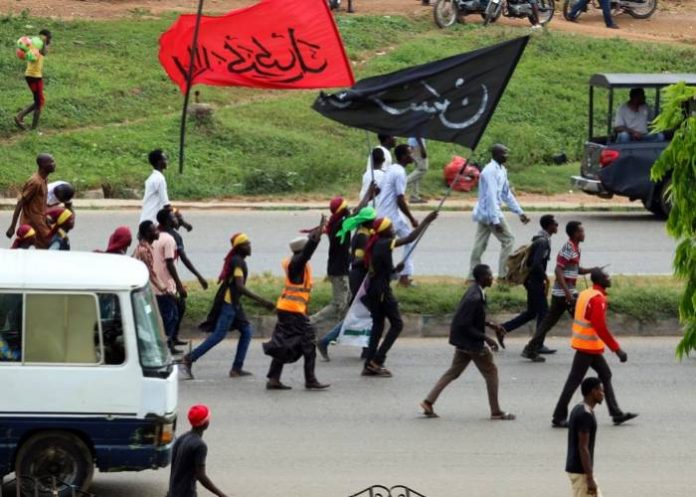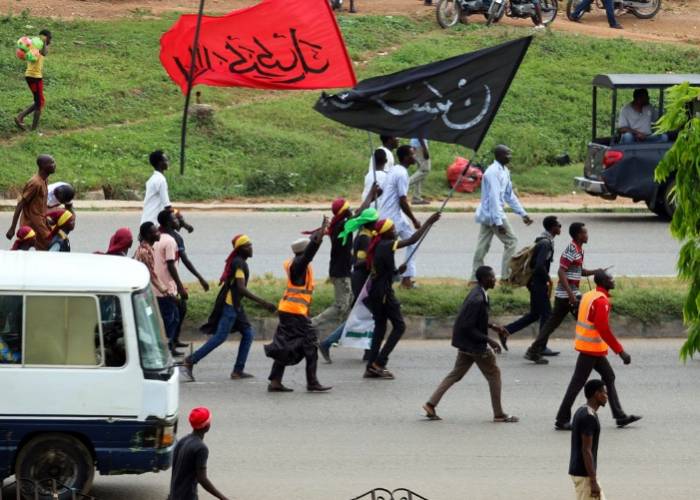
At least three people were killed when supporters of an imprisoned Shiite cleric clashed with security forces during a protest march in Abuja, prompting warnings to the government that a heavy-handed approach could radicalise elements in the group.
The military said troops and police on Monday “repelled the attack” by members of the Islamic Movement of Nigeria (IMN), who also “fired weapons”, threw stones and Molotov cocktails.
“Unfortunately during the encounter, three members of the sect were killed while four soldiers sustained various degrees of injuries,” the army said in a statement on Monday.
The deaths bring to six the number of IMN supporters who have been killed in demonstrations since Saturday and heighten concerns about further crackdowns on the group.
On Saturday, three IMN members were also killed during protests in Abuja. The army claimed the protesters attacked a military convoy and tried to steal weapons and ammunition.
Monday’s clashes happened at a checkpoint as security services stopped the protesters coming into the city.
AFP photographs of the aftermath showed several bodies of civilians on the ground near police but it was not clear whether they were dead or injured.
IMN spokesman Ibrahim Musa said they had received four bodies but indicated the death toll could be higher as “scores” of people were injured and troops took away others.
“We’re trying to verify the number,” he told AFP.
Long-running opposition
Human rights group Amnesty International said reports that troops fired live bullets at protesters were “very disturbing” and would be unlawful if they were unarmed.
The IMN has staged a series of demonstrations demanding the release of its leader Ibrahim Zakzaky, who has been in custody since December 2015 after clashes in the northern city of Zaria.
Then, the military was accused of killing more than 300 IMN supporters and burying them in mass graves.
Zakzaky has been at loggerheads with Nigeria’s secular authorities for years because of his calls for an Iranian-style Islamic revolution. Northern Nigeria is majority Sunni Muslim.
The cleric, who is in his mid-sixties and lost the sight in one eye during the 2015 clashes, has only been seen in public twice since he was detained.
Nigeria’s government has previously ignored a court order to release Zakzaky and his wife.
In April, at least 115 IMN supporters were arrested during protests in Abuja during which police used teargas and water cannon.
IMN processions for the annual Ashura festival have frequently been flashpoints. In November 2016, at least 10 people were killed when police opened fire near the northern city of Kano.
Radicalisation warning
Sustained clashes and the military’s use of deadly force have raised fears of a repeat of the 2009 crackdown on the Islamist group Boko Haram in northeast Nigeria.
Then, some 800 people, including Boko Haram leader Mohammed Yusuf, were killed in the Borno state capital, Maiduguri, forcing the group underground.
They then re-emerged a more deadly force under Yusuf’s deputy, Abubakar Shekau. The insurgency since then has killed more than 27,000 people and displaced more than two million others.
Amaechi Nwokolo, a security analyst at the Roman Institute for International Studies in Abuja, said: “It appears we are not learning from our past mistakes.”
He said the security forces had “no right to use that maximum force” on unarmed protesters, warning that it might “motivate others to radicalise”.
“If we go back to the formative days of Boko Haram, it was the killing of some innocent people that actually galvanised recruitment. That’s how terrorism works.”
Nigeria’s President Muhammadu Buhari, a former military ruler, was elected in 2015 on a promise to defeat Boko Haram and bring greater security.
But although weakened, Boko Haram attacks persist and there has been a resurgence of violence in the long-running resources conflict between sedentary farmers and nomadic herders.


